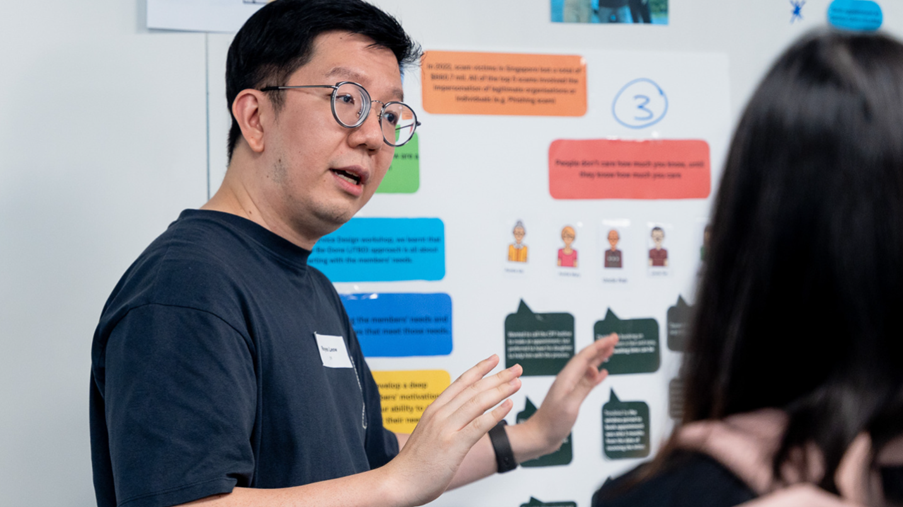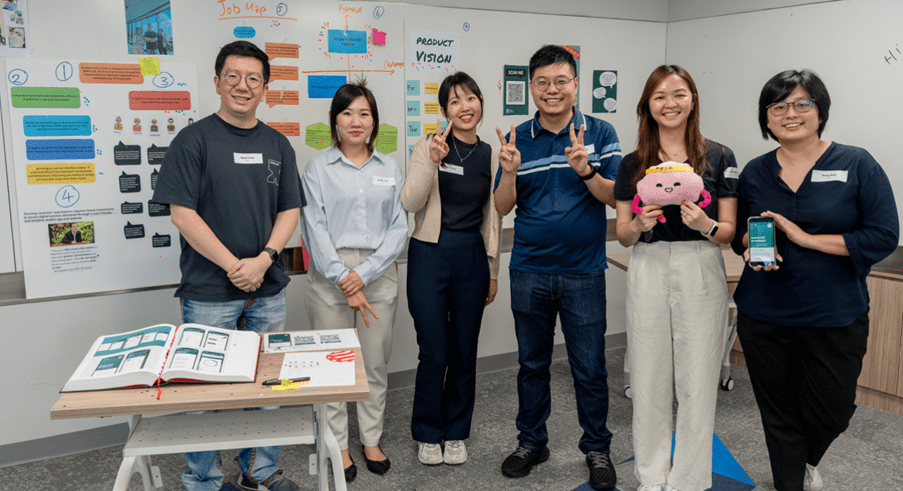The Digital Service Management Programme (DSMP) at NUS-ISS has provided invaluable skills and frameworks to participants, helping them transform how they approach product development. This 16-week programme emphasises service design from an outside-in perspective, putting public needs at the forefront. Participants conduct in-depth research to uncover unmet needs, leveraging tools like ‘Jobs-to-be-Done’ (JTBD), job mapping, and service blueprinting to clearly define the value of their service innovations. Additionally, they develop the ability to perform opportunity analysis, build business cases, and craft service strategies that drive digital transformation and deliver tangible benefits to the community. For three participants from the Central Provident Fund Board (CPFB) – Mr Reyes Leow, Ms Hay Yuxin, and Ms Tee Kai Qi – the programme was instrumental in reshaping their work on user-centric digital services.
For Reyes, Senior Manager of Digital Services at CPFB, the JTBD framework was a game changer. “It was eye-opening to understand that it’s not about solutions first, but about what the user needs to accomplish,” he explained. This shift in perspective led to innovative approaches to improve customer service processes within the Board.
Applying JTBD to real-world challenges, Reyes and his team conducted on-site research at a CPF service centre, uncovering key insights about user needs. “We discovered that many users don’t necessarily want to visit the service centre. They just need a seamless way to perform transactions,” he explained. This led to a practical solution that aligned with CPFB’s broader digital transformation goals. The team realised that offering video call services as an alternative to physical visits could significantly reduce the hassle for CPF members, especially for those with mobility issues or unfamiliar with digital tools.
 CPFB’s Reyes Leow presenting the team’s project ideas to the lecturers and sponsors.
CPFB’s Reyes Leow presenting the team’s project ideas to the lecturers and sponsors.
Yuxin, an IT Consultant in Digital Services at CPFB, echoed the importance of JTBD: “As a designer, it’s easy to get caught up in improving the user journey, but JTBD helped me refocus on what our members want to achieve.” Her team applied this framework to prioritise features that offer the most value to users, resulting in “a design that not only made communication more efficient but also more accessible to members who previously had to visit service centres for simple queries," Yuxin explained.
For Kai Qi, Manager of Digital Services at CPFB, the programme sharpened her critical thinking and ideation skills. “One of the highlights was learning how to quickly generate ideas through structured ideation techniques,” she shared. Applying these skills to improve the CPF website's user experience, Kai Qi explained, “We can now use these ideation techniques to brainstorm and refine features that directly address CPF members’ needs. It shifted our mindset from adding website features we thought were useful to delivering what truly matters most to our users.
What stood out most to the group was the collaborative nature of the programme. "The coaching sessions were particularly valuable," Reyes noted, praising the NUS-ISS lecturers. "We received real-time feedback on our work, which helped us refine our solutions at every stage." This hands-on approach created a dynamic learning environment where participants could directly apply their knowledge to projects. Yuxin emphasised the exceptional mentorship: "The lecturers were always willing to help, even beyond the formal sessions. That level of support made a significant difference."
 (From L-R) Reyes Leow, Senior Manager; Hay Yuxin, IT Consultant; Tee Kai Qi, Manager; Liu Lung Kwan, Group Director; Goh Jing Yeen, Director; Hong Zhen, Senior Deputy Director from CPFB's Digital Services Department
(From L-R) Reyes Leow, Senior Manager; Hay Yuxin, IT Consultant; Tee Kai Qi, Manager; Liu Lung Kwan, Group Director; Goh Jing Yeen, Director; Hong Zhen, Senior Deputy Director from CPFB's Digital Services Department
The diversity of the cohort further enriched the learning experience. “We had the opportunity to collaborate with participants from different agencies and backgrounds. It was enlightening to see how others approached their projects and how we could learn from their experiences,” said Kai Qi. This not only broadened perspectives but also created a strong, supportive peer network throughout the programme.
In terms of what they enjoyed most about DSMP, the consensus was clear: the programme's blend of theory and practical application was a winning formula. "The balance between learning frameworks like JTBD and applying them to real-world projects was perfect," Yuxin shared. For Reyes, the opportunity to represent CPFB during presentations and showcase the organisation’s achievements was particularly rewarding. “It gave me great pride to share what we were working on and how it would ultimately benefit Singaporeans,” he said.
As they continue in their respective roles, the skills gained from the DSMP have equipped them to be more strategic and user-focused in their work. "It’s not just about designing a product or prototype – it’s about creating solutions that truly meet users' needs," Yuxin concluded. Collectively, the team agreed that the programme provided them with not only theoretical knowledge but also practical tools and confidence to push for meaningful, user-centric changes in their organisation. Moving forward, they are committed to implementing user journey mapping in their work, ensuring each touchpoint addresses a specific JTBD. They believe this approach has the potential to transform how CPFB develops and delivers public services, placing user needs at the forefront of their initiatives.
For more information on courses offered by NUS-ISS' Digital Academy Services (DAS), please refer here.